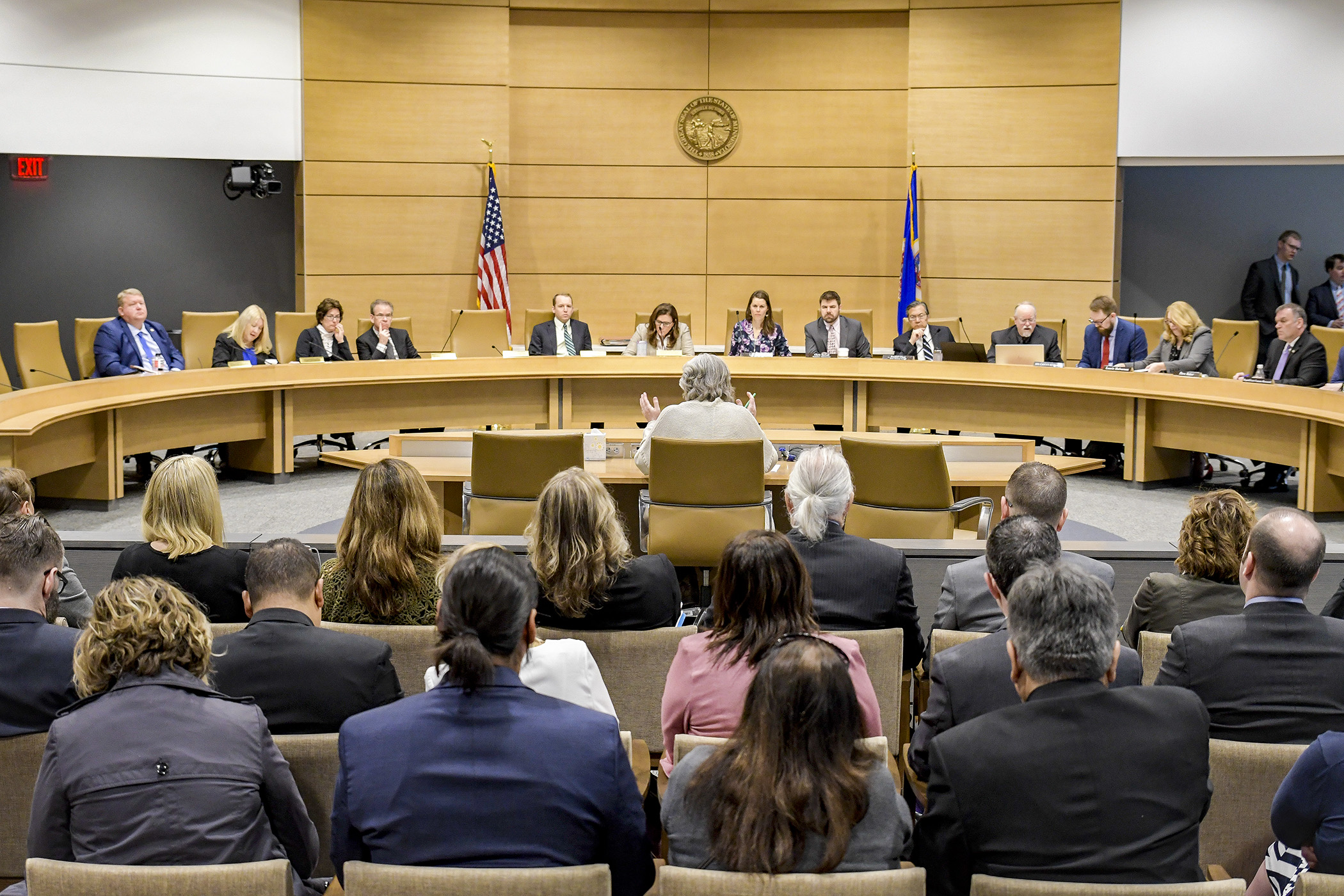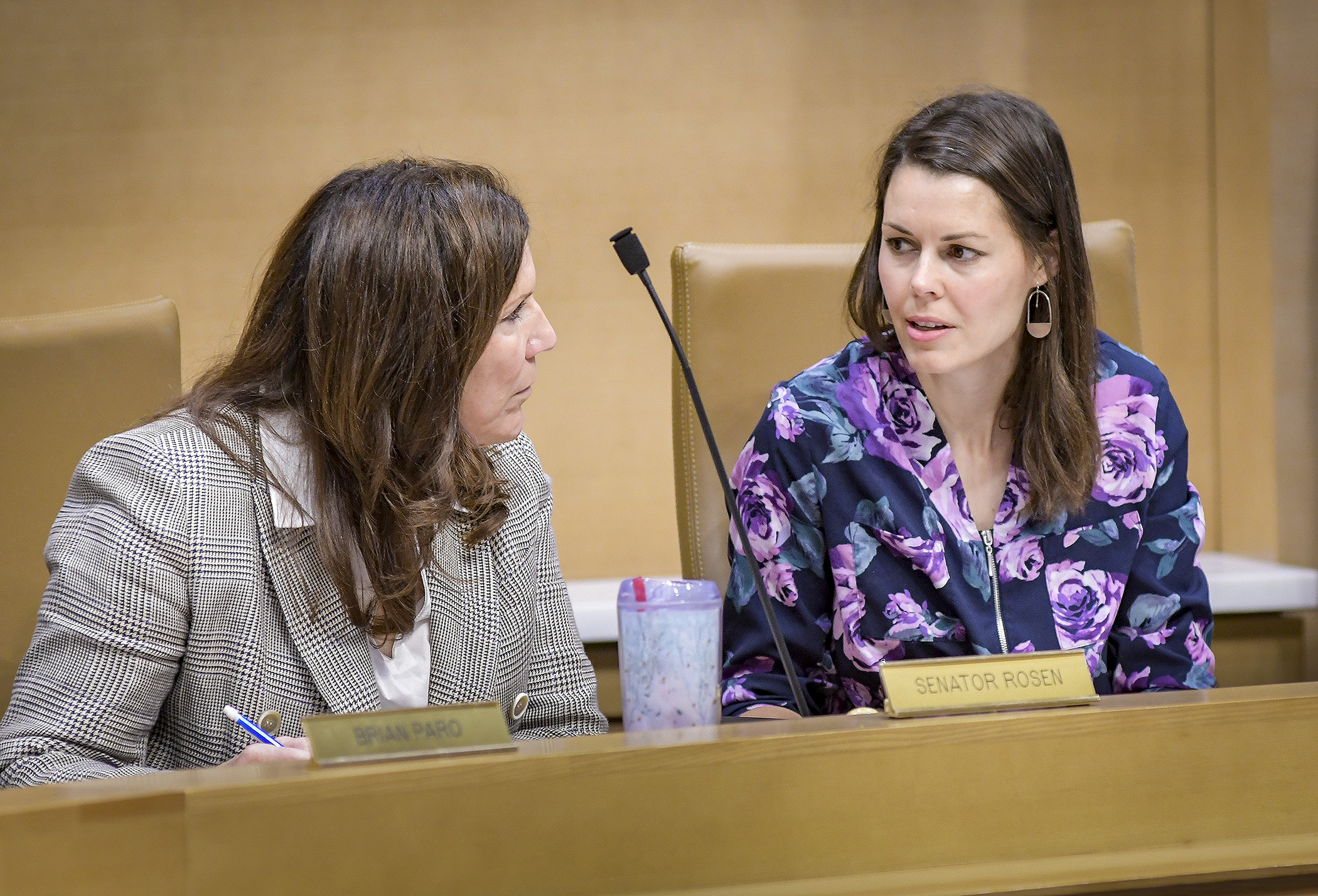State response to opioid crisis to be hashed out in conference committee

The waves of opioid addiction and related overdose deaths in Minnesota are a “true public health crisis” requiring a comprehensive, forward-thinking approach, testifiers told the conference committee working to craft the Legislature’s response to the epidemic.
 Sen. Julie Rosen and Rep. Liz Olson confer before the first meeting of the conference committee for the omnibus opioids bill May 6. Photo by Andrew VonBank
Sen. Julie Rosen and Rep. Liz Olson confer before the first meeting of the conference committee for the omnibus opioids bill May 6. Photo by Andrew VonBankConferees for HF400 met Monday to hear testimony regarding the scope of the epidemic and strategies that have proven effective, as well as concerns regarding the proposed legislation, including continued access for people with severe and chronic conditions.
“This is a piece of a puzzle” that involves many other proposals being heard in the health and human services conference committee, including the licensure of pharmacy benefit managers and drug pricing transparency, said Rep. Laurie Halverson (DFL-Eagan).
“This bill is very targeted, but Minnesota is taking other steps,” she said.
The House and Senate bills are trying, generally, to do the same things:
- expand access to treatment services and allow flexibility at the local and tribal level;
- provide funding to address the impact of the crisis on social service agencies, including increased out-of-home placements for children;
- create grants to support local and targeted prevention and treatment efforts;
- improve public awareness and education for medical providers;
- expand the variety of people who can administer opioid antagonists, which can prevent overdose deaths; and
- establish an Opioid Advisory Council to make funding recommendations.
The House and Senate proposals also have similar funding goals – around $20 million annually – to be generated via fees levied on entities involved in the production and distribution of opiates.
But those systems differ.
The House would require manufacturers and wholesalers to pay a collective total of $20 million a year – prorated and determined by each entity’s percentage of the overall sale and distribution of opioids in the state.
The Senate, in contrast, sets annual fees of $250,000 to be paid by any manufacturer that sells, delivers, or distributes at least 2 million units of opiates within the state. These fees would be reduced, however, if the state receives legal settlements from opioid manufacturers totaling $20 million or more.
The House position would not decrease fees, which has brought criticism of the bill for being overly punitive. Advocates disagree, saying the scope of the problem is so expansive, a long-term, widespread, and well-funded response is need.
Attorney General Keith Ellison testified on the ongoing court cases which could potentially result in these settlements, saying that legislative action would be needed to clearly direct lawsuit proceeds to help victims, their families, and communities.
Related Articles
Search Session Daily
Advanced Search OptionsPriority Dailies
Ways and Means Committee OKs proposed $512 million supplemental budget on party-line vote
By Mike Cook Meeting more needs or fiscal irresponsibility is one way to sum up the differences among the two parties on a supplemental spending package a year after a $72 billion state budg...
Meeting more needs or fiscal irresponsibility is one way to sum up the differences among the two parties on a supplemental spending package a year after a $72 billion state budg...
Minnesota’s projected budget surplus balloons to $3.7 billion, but fiscal pressure still looms
By Rob Hubbard Just as Minnesota has experienced a warmer winter than usual, so has the state’s budget outlook warmed over the past few months.
On Thursday, Minnesota Management and Budget...
Just as Minnesota has experienced a warmer winter than usual, so has the state’s budget outlook warmed over the past few months.
On Thursday, Minnesota Management and Budget...